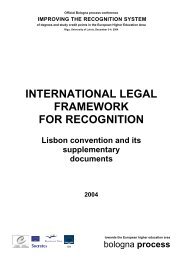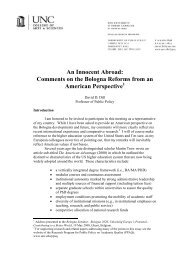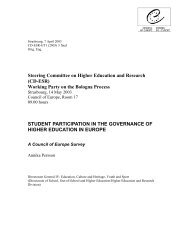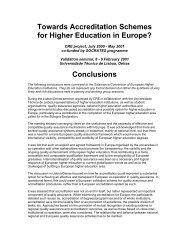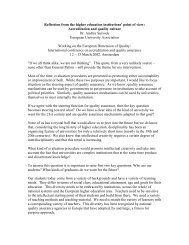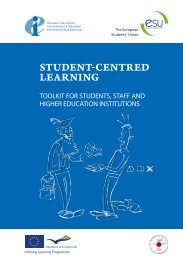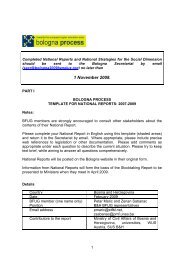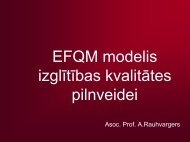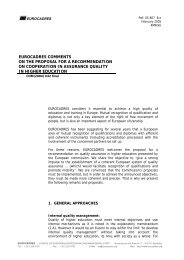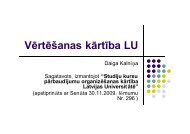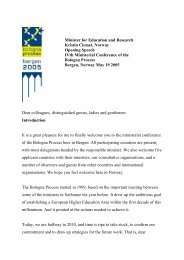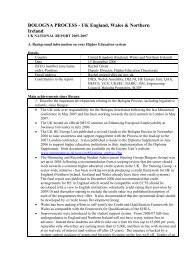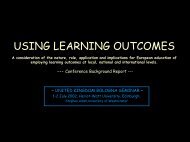EUA Survey Of Master Degrees In Europe - European University ...
EUA Survey Of Master Degrees In Europe - European University ...
EUA Survey Of Master Degrees In Europe - European University ...
Create successful ePaper yourself
Turn your PDF publications into a flip-book with our unique Google optimized e-Paper software.
5The regulated professionson the other hand, a coordinated attempt been made to facilitate movement between medicalfaculties.Labour market considerationsBachelor-<strong>Master</strong> sequences would also enable governments and regulatory authorities to createa new point of access to the professions – post-Bachelor. <strong>In</strong> Norway and Sweden the Bachelor inpharmacy is a qualified ‘prescriptionist’, but is allowed to own and manage a pharmacy only afterobtaining the <strong>Master</strong>. But this case is exceptional. The intercalation of a Bachelor qualification at ahalfway point in a long integrated programme is not yet well established in pharmacy across the46 Bologna countries. What it might mean for student finance, for the funding awarded to HEIs,for the division of professional labour in the sector concerned, and for onward progression to the<strong>Master</strong>, remains problematic in many countries and is the subject of continuing debate.The <strong>Europe</strong>an Commission, which has exclusive legal competence for the operation of the internalmarket, is sensitive to these issues. They go beyond the academic matters with which Bolognais principally concerned, touching on such policy lines as services of general interest, consumerprotection and the liberalisation of the professions.The recent Green Paper on the <strong>Europe</strong>an Workforce for Health illustrates the point. It includesamong the possible areas of future action: ‘investing to train and recruit sufficient health personnelto achieve self-sufficiency at EU level; encouraging cross-border agreements on training and staffexchanges…’Here it makes implicit reference to the difficulties experienced by Austria and Belgium. These twocountries have set quotas on the ‘excessive’ numbers of German and French students who gain entryto their medical and dental schools as a way of by-passing domestic numerus clausus. Temporarily,the Commission has suspended infringement proceedings, in order to allow Austria and Belgiumsufficient time to justify actions deemed by the <strong>Europe</strong>an Court of Justice to be illegal. Austria hastaken advantage of the suspension to impose a quota on veterinary students: from 2009, only 5%of the total can be non-EU students and only 20% can come from other EU Member States.It is not difficult to see that by facilitating student mobility, Bologna exposes the lack of congruencein national healthcare workforces and their funding frameworks. At the same time, it is clear thatits insistence on the readability of qualifications can help <strong>Europe</strong> respond to a range of pressingproblems. <strong>Europe</strong>’s dependence on third world healthcare workers will decrease. The need forqualified labour will continue to rise, as the burdens of ageing and obesity become more severe.Human and animal diseases have little difficulty crossing the EU’s internal borders. Healthcareproviders and patients too will become more mobile. From these points of view, protectionistattitudes to healthcare training are hard to sustain.Bologna’s qualifications framework and its insistence on learning outcomes can contributesignificantly to healthcare policy integration and service delivery at <strong>Europe</strong>an level. It is thereforeimportant that academic and professional bodies work towards consensus on what constitutes<strong>Master</strong>-level competence in the respective disciplines, and on how it can be attained in academicstructures which do not inhibit student and professional mobility. Much work has been done in thisarea, notably by nurses working within the framework of the Tuning Project, as well as by ERASMUSThematic Networks such as MEDINE (medicine), DentEd (dentistry) and PHARMINE (pharmacy).The Bachelor-<strong>Master</strong> sequence in medicine40<strong>In</strong> respect of the basic medical education programme for doctors, the Directive requires six full-timeyears or 5,500 hours of theoretical and practical training. One German HEI offers an insight into thecomplexity of the issues involved. It offers a wide portfolio of courses:



